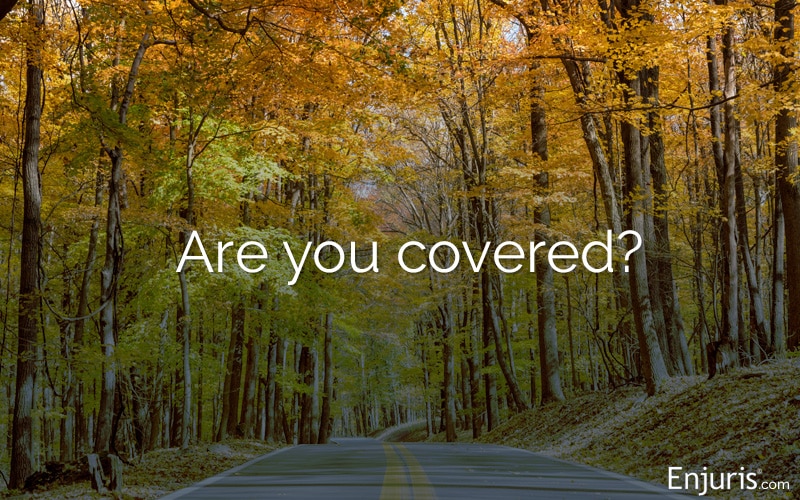
What happens if you drive without insurance in the Mountain State?
This guide offers a comprehensive look into West Virginia's auto insurance requirements, penalties for lack of coverage, and options available for recovering damages post-accident. Stay informed and navigate the roads with confidence.
In the event you find yourself injured in a car accident within the boundaries of West Virginia, the ability to recover damages will largely depend on the types of car insurance coverage available.
Let’s dive into the essential information you need.
Minimum auto insurance required in West Virginia
Auto liability insurance pays for damages suffered by another person in an accident in which you were at fault.
Liability insurance consists of two types of auto insurance:
- Bodily injury liability coverage pays the other person’s medical expenses (up to the policy limits). In some cases, the person’s lost wages and legal fees may also be covered.
- Property damage liability coverage pays the other person’s property damage (up to the policy limits).
In West Virginia, every motorist is required by law to carry the following minimum insurance coverages:
- $25,000 liability coverage for bodily injury or death per person.
- $50,000 liability coverage for total bodily injury or death liability per accident.
- $25,000 liability coverage for property damage per accident.
Additionally, motorists must carry uninsured motorist (UM) coverage. The minimum amounts mirror the liability coverage listed above:
- $25,000 for bodily injury or death per person.
- $50,000 for total bodily injury or death liability per accident.
- $25,000 for property damage per accident.
UM coverage provides protection in the event that you’re injured in an accident with an uninsured driver or a hit-and-run driver who is never identified.
Learn more about liability insurance, including how it works and whether it protects you if you’re involved in a car accident in another state.
Penalties for being uninsured in West Virginia
Driving without insurance in West Virginia is a serious offense. Penalties for this violation are outlined in West Virginia Code Section 17D-2A-7. These penalties include:
| Penalties for driving without auto insurance in West Virginia | |
|---|---|
| Offense | Penalty |
| First offense | License suspension for 30 days (proof of insurance must be provided within 30 days); reinstatement fees. |
| Second and subsequent offenses | License suspension for 90 days (proof of insurance must be provided within 90 days); reinstatement fees. |
The penalties, however, are not the only—or even the most severe consequence—of driving without proper insurance in the Mountain State.
The most severe consequence of driving without insurance is that uninsured drivers who cause an accident are personally liable for all of the damages that result.
Are you not concerned about being personally liable because you don’t have any money in your checking account?
Even if you don’t have any money in your bank account, the other driver can obtain a court order that allows them to garnish your future wages and sell your assets (including, in some cases, your house and vehicles).
Learn more about civil judgments, including the tools attorneys use to collect them.
Recovering damages after an accident in West Virginia
West Virginia is a “fault-based” or “tort” insurance state, meaning that the person who causes an accident is responsible for paying the damages that result.
This means West Virginia drivers who are not at fault for an accident have three options to recover damages:
- File an insurance claim with your own insurance company (in this situation, your insurance company will turn around and pursue reimbursement from the at-fault driver’s insurance company);
- File a third-party insurance claim directly with the at-fault driver’s insurance company; or
- File a personal injury lawsuit in civil court against the at-fault driver.
If the driver who causes an accident doesn’t have insurance, your options are to file a claim under your UM policy or file a personal injury lawsuit against the driver.
FAQs about auto insurance in West Virginia
West Virginia follows the modified comparative negligence rule. If you're less than 50 percent at fault, you can recover damages. However, your recovery will be reduced by your percentage of fault.
Yes. Given the high costs of medical treatment and potential property damages, many drivers opt for coverages beyond the state minimums, such as higher liability limits, comprehensive, collision, and medical payments coverage.
In West Virginia, auto insurance typically follows the car, not the driver. This means if you lend your vehicle to someone and they cause an accident, your insurance will be the primary source for covering the damages, even if the driver has their own separate policy. This could lead to increased premiums for you in the future.
West Virginia allows policyholders with multiple vehicles to stack uninsured or underinsured motorist coverage. This means if you have two cars each with a coverage limit of $25,000, you could potentially claim up to $50,000 if you're hit by an uninsured or underinsured driver. However, it's important to confirm the specifics of stacking with your insurance agent as certain conditions and limits may apply.
Classic or antique cars in West Virginia can qualify for special insurance policies that consider the unique value and use of these vehicles. While the state mandates still apply, classic car insurance often takes into account the car's agreed value, limited usage, and the care that classic car owners typically provide. It's essential to discuss with an agent experienced in classic car policies to ensure your vehicle is adequately protected.
Navigating the world of auto insurance in West Virginia can be overwhelming. However, understanding the basic principles of the state's insurance laws and your rights as a policyholder can provide you with the knowledge and confidence to navigate any situation. If ever in doubt, consider seeking advice from a legal professional.
See our guide Choosing a personal injury attorney.
